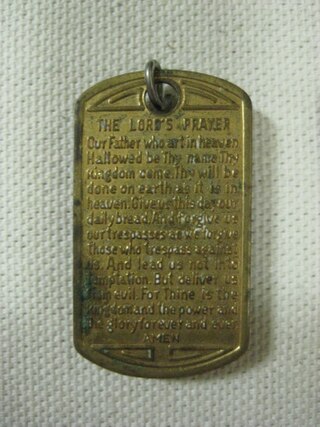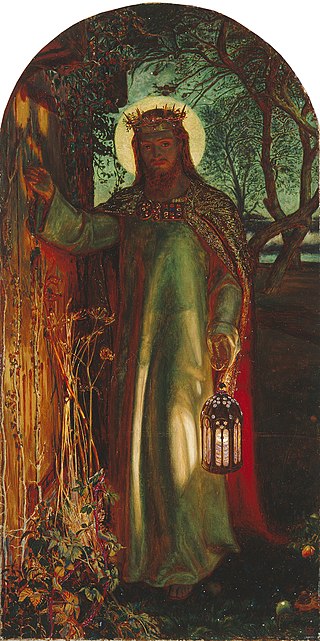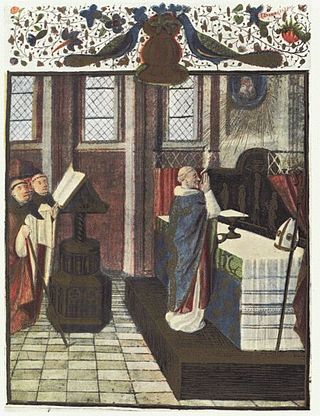
The Lord's Prayer, also called the Our Father or Pater Noster, is a central Christian prayer which Jesus taught as the way to pray. Two versions of this prayer are recorded in the gospels: a longer form within the Sermon on the Mount in the Gospel of Matthew, and a shorter form in the Gospel of Luke when "one of his disciples said to him, 'Lord, teach us to pray, as John taught his disciples'". Regarding the presence of the two versions, some have suggested that both were original, the Matthean version spoken by Jesus early in his ministry in Galilee, and the Lucan version one year later, "very likely in Judea".

A prayer rope is a loop made up of complex woven knots formed in a cross pattern, usually out of wool or silk. Prayer ropes are part of the practice of Eastern Christian monks and nuns and are employed by monastics to count the number of times one has prayed the Jesus Prayer or, occasionally, other prayers. The typical prayer rope has thirty three knots, representing the thirty three years of Christ's life. Among the Oriental Orthodoxy, it is used in the Coptic, Ethiopian, and Eritrean Orthodox Churches, where it is known by its Coptic or Ge'ez name.

The Jesus Prayer, also known as The Prayer, is a short formulaic prayer, esteemed and advocated especially in Eastern Christianity: "Lord Jesus Christ, Son of God, have mercy on me, a sinner." The prayer has been widely taught and discussed throughout the history of the Eastern Catholic Church and Eastern Orthodox Church. The ancient and original form did not include the words "a sinner", which were added later. It is often repeated continually as a part of personal ascetic practice, its use being an integral part of the eremitic tradition of prayer known as hesychasm. The prayer is particularly esteemed by the spiritual fathers of this tradition as a method of cleaning and opening up the mind and after this the heart, brought about first by the Prayer of the Mind, or more precisely the Noetic Prayer, and after this the Prayer of the Heart. The Prayer of the Heart is considered to be the Unceasing Prayer that the Apostle Paul advocates in the New Testament. Theophan the Recluse regarded the Jesus Prayer stronger than all other prayers by virtue of the power of the Holy Name of Jesus.

The epiclesis refers to the invocation of one or several gods. In ancient Greek religion, the epiclesis was the epithet used as the surname given to a deity in religious contexts. The term was borrowed into the Christian tradition, where it designates the part of the Anaphora by which the priest invokes the Holy Spirit upon the Eucharistic bread and wine in some Christian churches. In most Eastern Christian traditions, the Epiclesis comes after the Anamnesis ; in the Western Rite it usually precedes. In the historic practice of the Western Christian Churches, the consecration is effected at the Words of Institution though during the rise of the Liturgical Movement, many denominations introduced an explicit epiclesis in their liturgies.
Religions with the belief in a future judgment, a resurrection of the dead or a purgatory often offer prayers on behalf of the dead to God.

Intercession of the Saints is a Christian doctrine held by the Eastern Orthodox, Oriental Orthodox, Assyrian Church of the East and Catholic churches, and some Anglicans. The practice of praying through saints can be found in Christian writings from the 3rd century onward. The 4th-century Apostles' Creed states belief in the communion of Saints, which certain Christian churches interpret as supporting the intercession of saints. However, similar practices are controversial in Judaism, Islam, and Protestantism.
Absolution is a theological term for the forgiveness imparted by ordained Christian priests and experienced by Christian penitents. It is a universal feature of the historic churches of Christendom, although the theology and the practice of absolution vary between Christian denominations.

Matthew 6:9 is the ninth verse of the sixth chapter of the Gospel of Matthew in the New Testament and is part of the Sermon on the Mount. This verse is the opening of the Lord's Prayer, one of the best known parts of the entire New Testament.

Matthew 6:10 is the tenth verse of the sixth chapter of the Gospel of Matthew in the New Testament and is part of the Sermon on the Mount. This verse is the second one of the Lord's Prayer, one of the best known parts of the entire New Testament. This verse contains the second and third petitions to God.

Matthew 6:11 is the eleventh verse of the sixth chapter of the Gospel of Matthew in the New Testament and forms part of the Sermon on the Mount. This verse is the third one of the Lord's Prayer, one of the best known parts of the entire New Testament. This brief verse contains the fourth petition to God.

Matthew 6:12 is the twelfth verse of the sixth chapter of the Gospel of Matthew in the New Testament and is part of the Sermon on the Mount. This verse is the fourth one of the Lord's Prayer, one of the best known parts of the entire New Testament. This verse contains the fifth petition to God.

The Sinner's prayer is an evangelical Christian term referring to any prayer of repentance, prayed by individuals who feel sin in their lives and have the desire to form or renew a personal relationship with God through Jesus Christ. It is a popular prayer in evangelical circles. It is not intended as liturgical like a creed or a confiteor said or chanted within the Catholic Mass, but rather, is intended to be an act of initial conversion to Christianity; at the same time, it is roughly analogous to the Catholic Act of Contrition, though the theology behind each is markedly different, due to the intrinsically different views of salvation between Catholicism and Protestantism. While some Christians see reciting the sinner's prayer as the moment defining one's salvation, others see it as a beginning step of one's lifelong faith journey.

Matthew 15:27 is a verse in the fifteenth chapter of the Gospel of Matthew in the New Testament.

The Divine Service is a title given to the Eucharistic liturgy as used in the various Lutheran churches. It has its roots in the Pre-Tridentine Mass as revised by Martin Luther in his Formula missae of 1523 and his Deutsche Messe of 1526. It was further developed through the Kirchenordnungen of the sixteenth and seventeenth centuries that followed in Luther's tradition.
In Christian liturgical worship, preces, also known in the Anglican prayer book tradition as the suffrages, are short petitions that are said or sung as versicles and responses by the officiant and congregation respectively. It is one of the oldest forms of prayer in Christianity, rooted in the pre-Christian Hebrew prayers of the Psalms used in Temple worship.

Thanksgiving after Communion is a spiritual practice among Christians who believe in the Real Presence of Jesus Christ in the Communion bread, maintaining themselves in prayer for some time to thank God and especially listening in their hearts for guidance from their Divine guest. This practice was and is highly recommended by saints, theologians, and Doctors of the Church.
Good Friday Prayer can refer to any of the prayers prayed by Christians on Good Friday, the Friday before Easter, or to all such prayers collectively.

The Manchurian revival of 1908 was a Protestant revival that occurred in churches and mission stations in Manchuria.

Ad orientem, meaning "to the east" in Ecclesiastical Latin, is a phrase used to describe the eastward orientation of Christian prayer and Christian worship, comprising the preposition ad (toward) and oriens, participle of orior.

Among Eastern Orthodox and Eastern-Rite Catholic Christians, holy water is blessed in the church and given to the faithful to drink at home when needed and to bless their homes. In the weeks following the Feast of Epiphany, clergy visit the homes of parishioners and conduct a service of blessing using the holy water that was blessed on the Feast of Theophany. For baptism, the water is sanctified with a special blessing.














